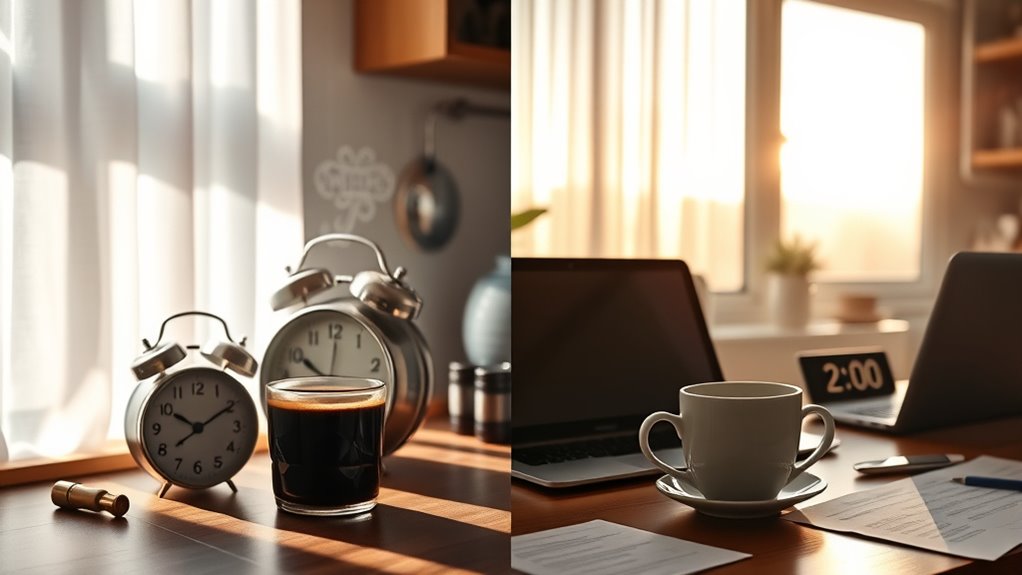Choosing to have coffee in the morning or afternoon depends on your goals and sensitivity. Morning coffee boosts alertness early in the day and helps you start strong, while afternoon coffee can fight post-lunch fatigue. Just be mindful of timing so it doesn’t interfere with your sleep—preferably finish your last cup six hours before bed. For personalized advice on optimizing your caffeine schedule, keep exploring how timing affects your performance.
Key Takeaways
- Morning coffee boosts alertness early in the day, ideal for starting tasks and overcoming sleep deprivation.
- Afternoon coffee can combat post-lunch fatigue but should be consumed at least six hours before bedtime to prevent sleep disruption.
- Timing caffeine intake around your body’s half-life (3-5 hours) helps maintain energy without impairing nighttime sleep.
- Personal caffeine sensitivity influences optimal timing; adjust consumption to avoid jitters or sleep issues.
- Properly scheduled caffeine intake enhances performance while minimizing risks like dependence and sleep disturbances.

Many people wonder whether drinking coffee in the morning or in the afternoon is better for their energy and focus. The timing of your caffeine intake can greatly influence how alert you feel throughout the day, but it also affects your sleep and overall well-being. When you consume coffee, caffeine absorption happens quickly, typically within 30 to 60 minutes, giving you that immediate boost. However, the timing of your coffee intake plays an essential role in how long that boost lasts and how it interacts with your sleep cycle.
Drinking coffee in the morning can help you start your day with increased alertness, especially if you haven’t had enough restful sleep. The caffeine absorption process is rapid, so you’ll notice the effects soon after your first sip. This can be particularly helpful during early mornings when your energy is low or when you need to focus on demanding tasks. However, if you consume coffee too early or in excess, it can lead to sleep disruption later on. Caffeine has a half-life of about 3 to 5 hours, meaning it stays in your system for quite a while. Drinking coffee late in the morning or early afternoon might interfere with your ability to fall asleep at night, especially if you’re sensitive to caffeine.
Morning coffee boosts alertness but can disrupt sleep if consumed too late in the day.
In the afternoon, many find that a cup of coffee can serve as a helpful pick-me-up to combat the post-lunch slump. But you need to be strategic about timing. If you drink coffee too late in the day, the caffeine absorption may still be active when you’re trying to wind down, potentially disrupting your sleep. Sleep disruption caused by late caffeine intake can lead to a cycle of fatigue and reliance on more coffee, creating a vicious circle. To maximize your energy without sacrificing sleep, it’s best to finish your last cup at least six hours before bedtime. This allows the caffeine to clear your system enough that it won’t interfere with falling asleep.
Additionally, understanding your personal caffeine sensitivity can help you optimize your intake for better performance and sleep quality. Ultimately, the best approach depends on your personal sensitivity to caffeine and your schedule. By understanding caffeine absorption and how it influences sleep, you can tailor your coffee consumption to boost your energy during the day while protecting your sleep quality at night. Timing your caffeine intake thoughtfully allows you to stay alert and productive without the negative side effects that come from poor sleep or overuse.
Frequently Asked Questions
How Does Coffee Timing Affect Sleep Quality?
You might notice that coffee timing impacts your sleep quality because caffeine can cause sleep disruption if consumed too late. Caffeine metabolism varies from person to person, so drinking coffee closer to bedtime prolongs its effects, making it harder to fall asleep. To avoid sleep issues, it’s best to limit caffeine intake at least six hours before bed, giving your body enough time to process it and promote better sleep quality.
Can Afternoon Coffee Cause Dehydration?
Did you know that caffeine can increase urine production by up to 30%? Drinking coffee in the afternoon might temporarily impact your hydration levels, but it generally doesn’t cause dehydration if you stay mindful. Caffeine absorption peaks within 30-60 minutes, so your body’s response varies. To stay well-hydrated, balance your coffee intake with plenty of water, especially if you’re drinking it later in the day.
Is It Better to Drink Coffee Before or After Meals?
You should drink coffee after meals to improve meal absorption and reduce gastric discomfort. Consuming caffeine on an empty stomach can irritate your stomach lining and slow digestion. When you have coffee post-meal, it helps your body absorb nutrients better and minimizes discomfort. Avoid drinking coffee immediately before meals, as it might interfere with digestion and cause stomach upset, making it better to wait a little while after eating.
How Does Caffeine Tolerance Influence Optimal Timing?
Caffeine tolerance markedly influences the best timing for your coffee. If you develop caffeine dependence and tolerance buildup, you might need to consume more or time it differently to get the same boost. To maximize effects, you should space out your intake, avoiding late-day consumption that could disrupt sleep. Listening to your body helps, as adjusting timing based on your tolerance ensures you stay alert without increasing dependency risks.
What Are the Long-Term Health Impacts of Coffee Timing?
Focusing on the long-term health impacts of coffee timing, you might notice effects on your metabolic health and cardiovascular system. Drinking coffee at ideal times can improve metabolic effects, like better blood sugar regulation, and support cardiovascular health by reducing blood pressure spikes. Conversely, inconsistent timing may lead to increased stress on your heart and metabolism over years, so paying attention to when you consume caffeine helps promote better long-term health.
Conclusion
Choosing the right time for your coffee can boost your performance. For example, if you have a big afternoon meeting, having coffee about an hour beforehand can sharpen your focus. Conversely, drinking coffee too late might interfere with your sleep and reduce your productivity the next day. By timing your caffeine intake wisely—like enjoying morning coffee for energy or afternoon for a boost—you’ll get the most out of your day without disrupting your rest.









